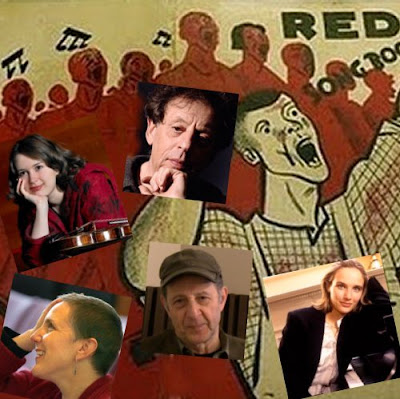BBC Radio 3 - no live music after 7pm
 George Orwell lived long enough to know the Third Programme; he adapted his own Animal Farm for it. Language that is manipulative and deceitful is now for ever Orwellian. He would have undoubtedly recognised some of the ways in which the Third’s successor, Radio 3, has sought to neutralise hostility and influence reaction to its controversial new schedule, which began yesterday.
George Orwell lived long enough to know the Third Programme; he adapted his own Animal Farm for it. Language that is manipulative and deceitful is now for ever Orwellian. He would have undoubtedly recognised some of the ways in which the Third’s successor, Radio 3, has sought to neutralise hostility and influence reaction to its controversial new schedule, which began yesterday.Its changes are many. Nine shows have been axed. Another five have been moved. Apart from the Proms and other special seasons, and the last act of some New York operas, there will be no live music after 7pm. Late Junction is reduced, Discovering Music extended. There will be a new weekday breakfast host, six new series and afternoon opera.
Well aware that some of this was attacked when partly leaked last November, the BBC has acted decisively. All the main Radio 3 message boards — forums for listeners to give their opinions and let off steam — will be closed from tomorrow. Radio Times and Radio 3’s official announcement of the changes carry not a word about the abolished shows. There was no explanation beforehand as to why they had to go, and no mention of them afterwards. They have just been swept away. Those who laboured on them are presumably now nonpersons. The fact that it was the final edition of all these shows was deliberately left out of all billings and press information. Roger Wright, the controller of Radio 3, has declined to appear on Feedback to defend himself, and ignored the changes in his monthly newsletter.
Chilling, and there is more. Mark Russell, who was the co-host, with Robert Sandall, of Mixing It, which for 16 years featured experimental and improvised music, says on his blog: “Some listeners wondered why Robert and I didn’t make a statement on air. The reason is because it wouldn’t have been broadcast. We recorded our final show yesterday, a few hours before it was broadcast. A BBC senior editor sat through the whole thing. I can’t ever remember that happening before.”
On An Overgrown Path is not the only one saying it, this is Paul Donovan writing in the Times. And don't think the loss of live music on BBC Radio 3 after 7pm, except for the Proms and one offs, is a little local problem here in the UK. It will affect the commissioning and performance of contemporary music from around the world, and will put the livelihood of many fine musicians at risk.
Back in March 2005 On An Overgrown Path said These moments are rare in radio. Sadly, as of this week, they are now even rarer
Any copyrighted material on these pages is included as "fair use", for the purpose of study, review or critical analysis only, and will be removed at the request of copyright owner(s). Report broken links, missing images and other errors to - overgrownpath at hotmail dot co dot uk









Comments
And don't think the loss of live music on BBC Radio 3 after 7pm, except for the Proms and one offs, is a little local problem here in the UK. It will affect the commissioning and performance of contemporary music from around the world, and will put the livelihood of many fine musicians at risk.
Pliable, if you think that BBC Radio Three is committing a serious crime against contemporary musical culture and the livelihood's of contemporary musicians, you should see the huge criminal acts being committed by the newly restored Classical music station in America's nation's capital -- WETA-FM, which now (unlike a generation ago when concerts from Ameican orchestras and European radio systems were relayed on a delayed and weekly basis often featuring major American, European, and Japanese classical music world premieres) plays virtually no contemporary music by living composers, or virtually any American composers for that matter! They do however still broadcast the Metropolitan Opera so that Tan Dun did get some exposure early last month as the only living composer of classical music worthy of cultural consideration in America today.
See:
http://www.weta.org/fm/